Christian Psychology and Integration Perspectives: An Overview
VerifiedAdded on 2023/01/19
|5
|1051
|80
Essay
AI Summary
This essay delves into the field of Christian psychology and its integration perspective. It begins by defining Christian psychology as a perspective that uses Christian faith to understand human nature, contrasting it with modern psychology and highlighting its strengths, such as demystifying psychology and shedding light on the discipline's beginnings, while also acknowledging its weakness in not considering modern psychological approaches. The essay then explores integration, which combines biblical scriptures with secular psychology, outlining its advantages, such as being guided by psychological research and overcoming the limitations of Christian psychology, while also noting its weakness in needing to align with scripture. It concludes by emphasizing the complementary relationship between the two approaches, underscoring the importance of understanding this relationship to enhance the quality of psychological care, especially considering the religious background of the counseled individual.
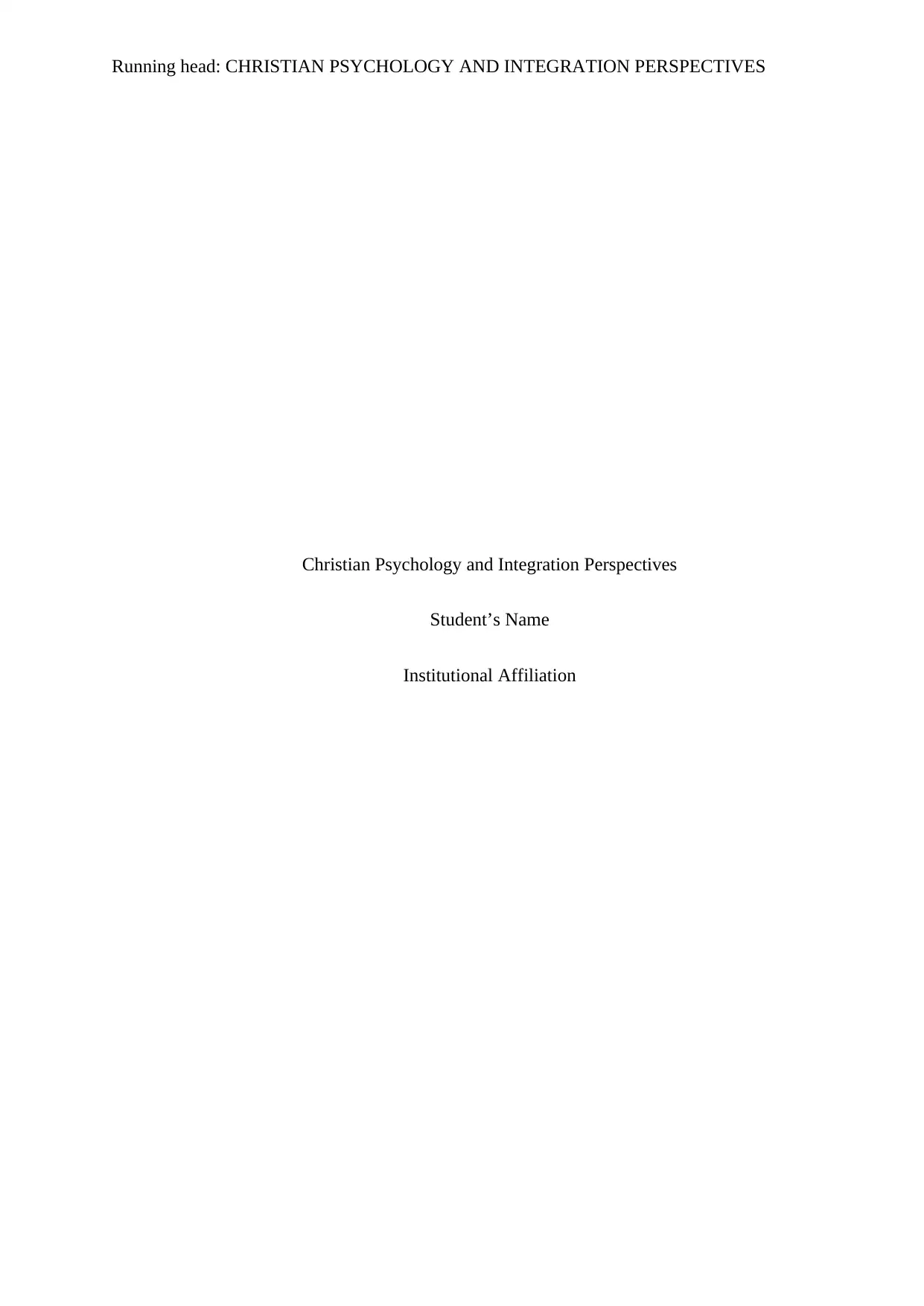
Running head: CHRISTIAN PSYCHOLOGY AND INTEGRATION PERSPECTIVES
Christian Psychology and Integration Perspectives
Student’s Name
Institutional Affiliation
Christian Psychology and Integration Perspectives
Student’s Name
Institutional Affiliation
Paraphrase This Document
Need a fresh take? Get an instant paraphrase of this document with our AI Paraphraser
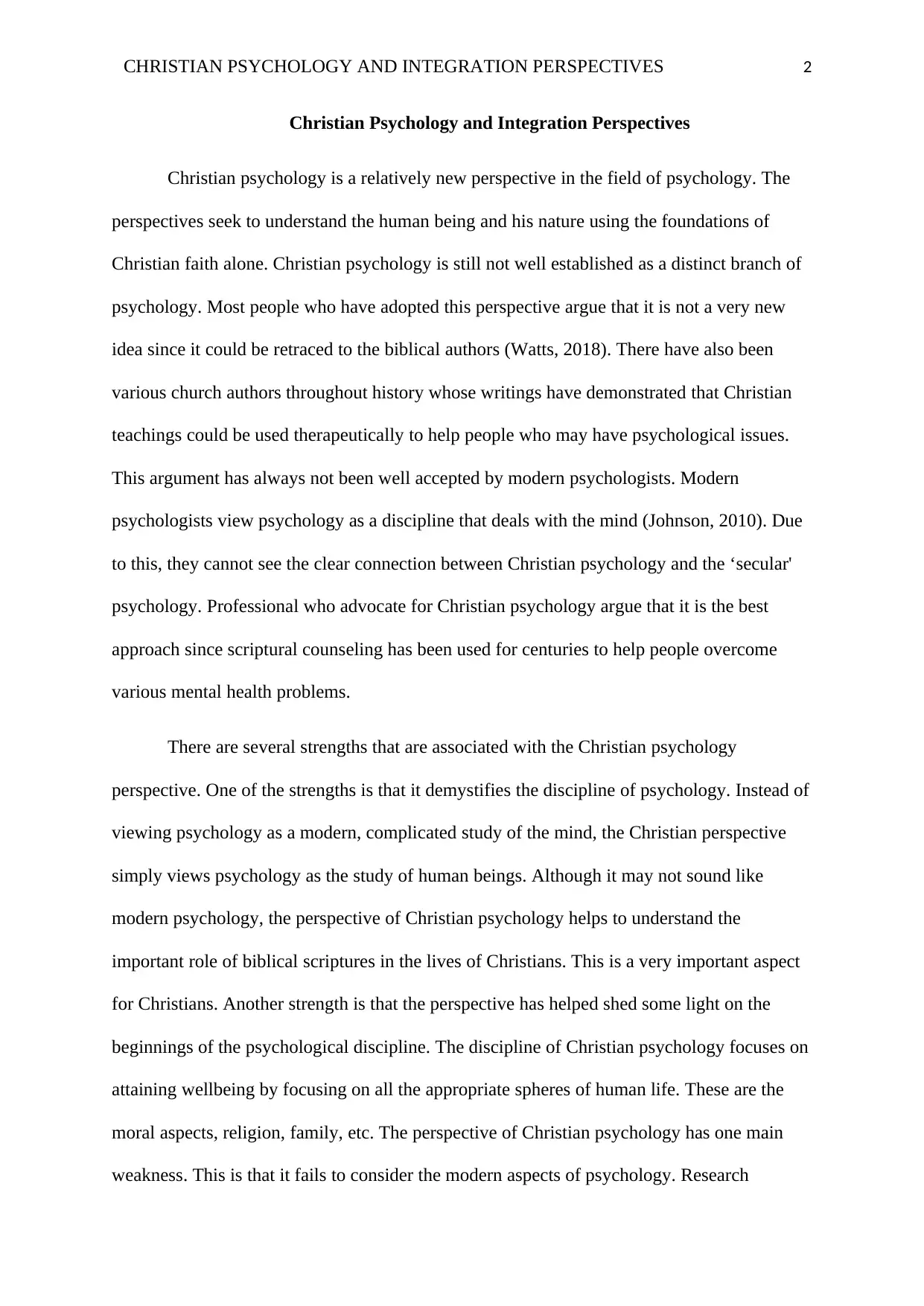
CHRISTIAN PSYCHOLOGY AND INTEGRATION PERSPECTIVES 2
Christian Psychology and Integration Perspectives
Christian psychology is a relatively new perspective in the field of psychology. The
perspectives seek to understand the human being and his nature using the foundations of
Christian faith alone. Christian psychology is still not well established as a distinct branch of
psychology. Most people who have adopted this perspective argue that it is not a very new
idea since it could be retraced to the biblical authors (Watts, 2018). There have also been
various church authors throughout history whose writings have demonstrated that Christian
teachings could be used therapeutically to help people who may have psychological issues.
This argument has always not been well accepted by modern psychologists. Modern
psychologists view psychology as a discipline that deals with the mind (Johnson, 2010). Due
to this, they cannot see the clear connection between Christian psychology and the ‘secular'
psychology. Professional who advocate for Christian psychology argue that it is the best
approach since scriptural counseling has been used for centuries to help people overcome
various mental health problems.
There are several strengths that are associated with the Christian psychology
perspective. One of the strengths is that it demystifies the discipline of psychology. Instead of
viewing psychology as a modern, complicated study of the mind, the Christian perspective
simply views psychology as the study of human beings. Although it may not sound like
modern psychology, the perspective of Christian psychology helps to understand the
important role of biblical scriptures in the lives of Christians. This is a very important aspect
for Christians. Another strength is that the perspective has helped shed some light on the
beginnings of the psychological discipline. The discipline of Christian psychology focuses on
attaining wellbeing by focusing on all the appropriate spheres of human life. These are the
moral aspects, religion, family, etc. The perspective of Christian psychology has one main
weakness. This is that it fails to consider the modern aspects of psychology. Research
Christian Psychology and Integration Perspectives
Christian psychology is a relatively new perspective in the field of psychology. The
perspectives seek to understand the human being and his nature using the foundations of
Christian faith alone. Christian psychology is still not well established as a distinct branch of
psychology. Most people who have adopted this perspective argue that it is not a very new
idea since it could be retraced to the biblical authors (Watts, 2018). There have also been
various church authors throughout history whose writings have demonstrated that Christian
teachings could be used therapeutically to help people who may have psychological issues.
This argument has always not been well accepted by modern psychologists. Modern
psychologists view psychology as a discipline that deals with the mind (Johnson, 2010). Due
to this, they cannot see the clear connection between Christian psychology and the ‘secular'
psychology. Professional who advocate for Christian psychology argue that it is the best
approach since scriptural counseling has been used for centuries to help people overcome
various mental health problems.
There are several strengths that are associated with the Christian psychology
perspective. One of the strengths is that it demystifies the discipline of psychology. Instead of
viewing psychology as a modern, complicated study of the mind, the Christian perspective
simply views psychology as the study of human beings. Although it may not sound like
modern psychology, the perspective of Christian psychology helps to understand the
important role of biblical scriptures in the lives of Christians. This is a very important aspect
for Christians. Another strength is that the perspective has helped shed some light on the
beginnings of the psychological discipline. The discipline of Christian psychology focuses on
attaining wellbeing by focusing on all the appropriate spheres of human life. These are the
moral aspects, religion, family, etc. The perspective of Christian psychology has one main
weakness. This is that it fails to consider the modern aspects of psychology. Research
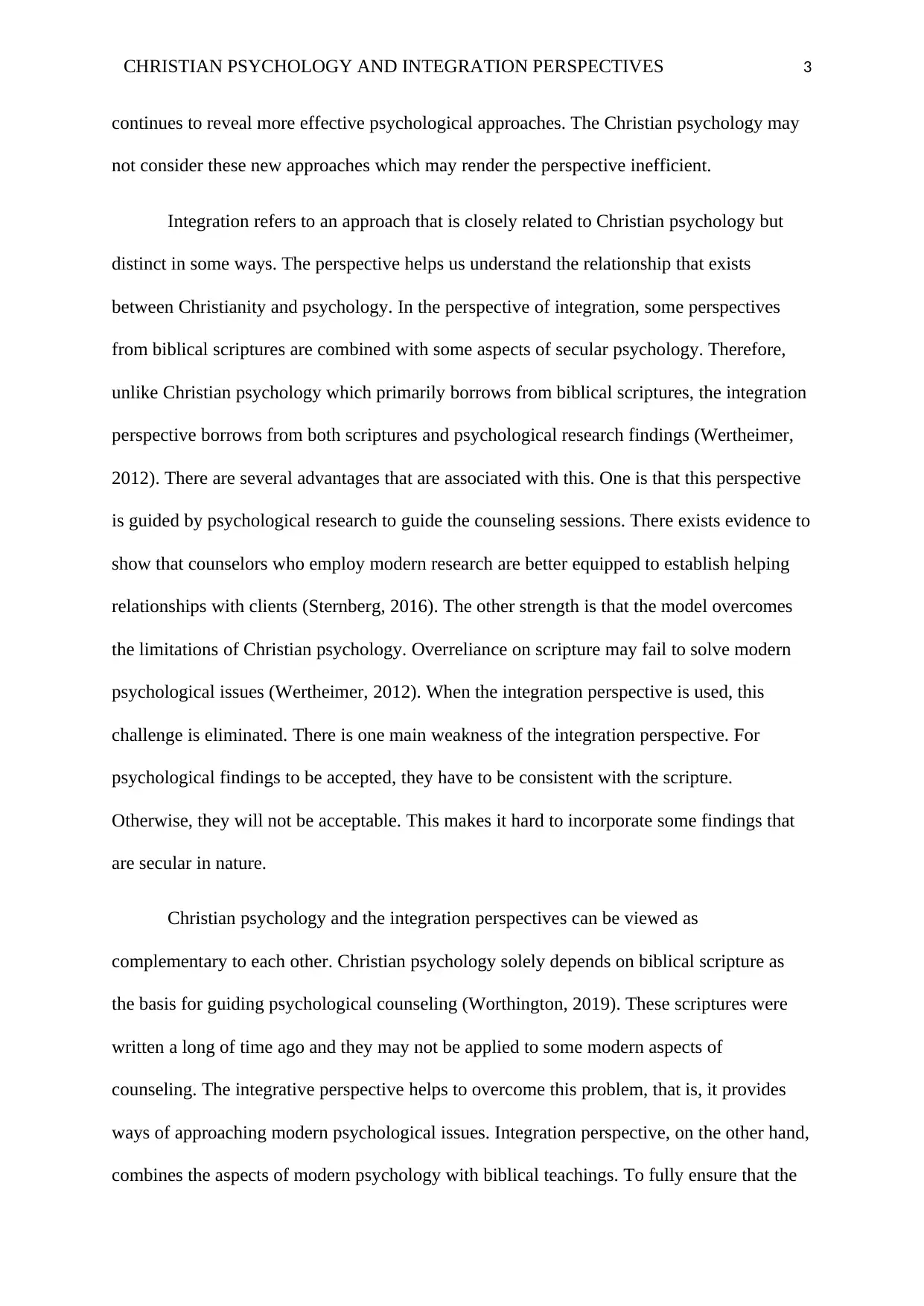
CHRISTIAN PSYCHOLOGY AND INTEGRATION PERSPECTIVES 3
continues to reveal more effective psychological approaches. The Christian psychology may
not consider these new approaches which may render the perspective inefficient.
Integration refers to an approach that is closely related to Christian psychology but
distinct in some ways. The perspective helps us understand the relationship that exists
between Christianity and psychology. In the perspective of integration, some perspectives
from biblical scriptures are combined with some aspects of secular psychology. Therefore,
unlike Christian psychology which primarily borrows from biblical scriptures, the integration
perspective borrows from both scriptures and psychological research findings (Wertheimer,
2012). There are several advantages that are associated with this. One is that this perspective
is guided by psychological research to guide the counseling sessions. There exists evidence to
show that counselors who employ modern research are better equipped to establish helping
relationships with clients (Sternberg, 2016). The other strength is that the model overcomes
the limitations of Christian psychology. Overreliance on scripture may fail to solve modern
psychological issues (Wertheimer, 2012). When the integration perspective is used, this
challenge is eliminated. There is one main weakness of the integration perspective. For
psychological findings to be accepted, they have to be consistent with the scripture.
Otherwise, they will not be acceptable. This makes it hard to incorporate some findings that
are secular in nature.
Christian psychology and the integration perspectives can be viewed as
complementary to each other. Christian psychology solely depends on biblical scripture as
the basis for guiding psychological counseling (Worthington, 2019). These scriptures were
written a long of time ago and they may not be applied to some modern aspects of
counseling. The integrative perspective helps to overcome this problem, that is, it provides
ways of approaching modern psychological issues. Integration perspective, on the other hand,
combines the aspects of modern psychology with biblical teachings. To fully ensure that the
continues to reveal more effective psychological approaches. The Christian psychology may
not consider these new approaches which may render the perspective inefficient.
Integration refers to an approach that is closely related to Christian psychology but
distinct in some ways. The perspective helps us understand the relationship that exists
between Christianity and psychology. In the perspective of integration, some perspectives
from biblical scriptures are combined with some aspects of secular psychology. Therefore,
unlike Christian psychology which primarily borrows from biblical scriptures, the integration
perspective borrows from both scriptures and psychological research findings (Wertheimer,
2012). There are several advantages that are associated with this. One is that this perspective
is guided by psychological research to guide the counseling sessions. There exists evidence to
show that counselors who employ modern research are better equipped to establish helping
relationships with clients (Sternberg, 2016). The other strength is that the model overcomes
the limitations of Christian psychology. Overreliance on scripture may fail to solve modern
psychological issues (Wertheimer, 2012). When the integration perspective is used, this
challenge is eliminated. There is one main weakness of the integration perspective. For
psychological findings to be accepted, they have to be consistent with the scripture.
Otherwise, they will not be acceptable. This makes it hard to incorporate some findings that
are secular in nature.
Christian psychology and the integration perspectives can be viewed as
complementary to each other. Christian psychology solely depends on biblical scripture as
the basis for guiding psychological counseling (Worthington, 2019). These scriptures were
written a long of time ago and they may not be applied to some modern aspects of
counseling. The integrative perspective helps to overcome this problem, that is, it provides
ways of approaching modern psychological issues. Integration perspective, on the other hand,
combines the aspects of modern psychology with biblical teachings. To fully ensure that the
⊘ This is a preview!⊘
Do you want full access?
Subscribe today to unlock all pages.

Trusted by 1+ million students worldwide
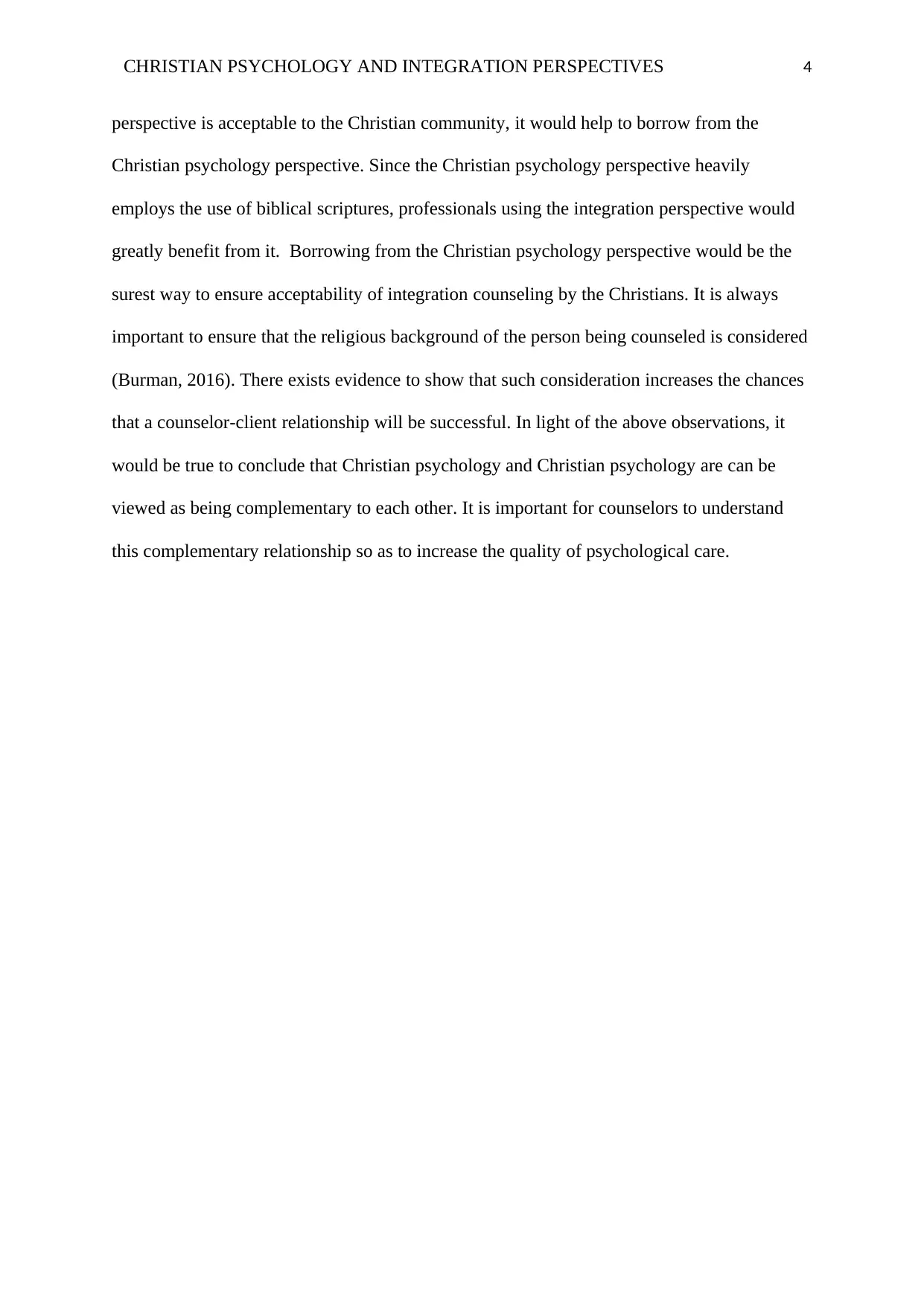
CHRISTIAN PSYCHOLOGY AND INTEGRATION PERSPECTIVES 4
perspective is acceptable to the Christian community, it would help to borrow from the
Christian psychology perspective. Since the Christian psychology perspective heavily
employs the use of biblical scriptures, professionals using the integration perspective would
greatly benefit from it. Borrowing from the Christian psychology perspective would be the
surest way to ensure acceptability of integration counseling by the Christians. It is always
important to ensure that the religious background of the person being counseled is considered
(Burman, 2016). There exists evidence to show that such consideration increases the chances
that a counselor-client relationship will be successful. In light of the above observations, it
would be true to conclude that Christian psychology and Christian psychology are can be
viewed as being complementary to each other. It is important for counselors to understand
this complementary relationship so as to increase the quality of psychological care.
perspective is acceptable to the Christian community, it would help to borrow from the
Christian psychology perspective. Since the Christian psychology perspective heavily
employs the use of biblical scriptures, professionals using the integration perspective would
greatly benefit from it. Borrowing from the Christian psychology perspective would be the
surest way to ensure acceptability of integration counseling by the Christians. It is always
important to ensure that the religious background of the person being counseled is considered
(Burman, 2016). There exists evidence to show that such consideration increases the chances
that a counselor-client relationship will be successful. In light of the above observations, it
would be true to conclude that Christian psychology and Christian psychology are can be
viewed as being complementary to each other. It is important for counselors to understand
this complementary relationship so as to increase the quality of psychological care.
Paraphrase This Document
Need a fresh take? Get an instant paraphrase of this document with our AI Paraphraser
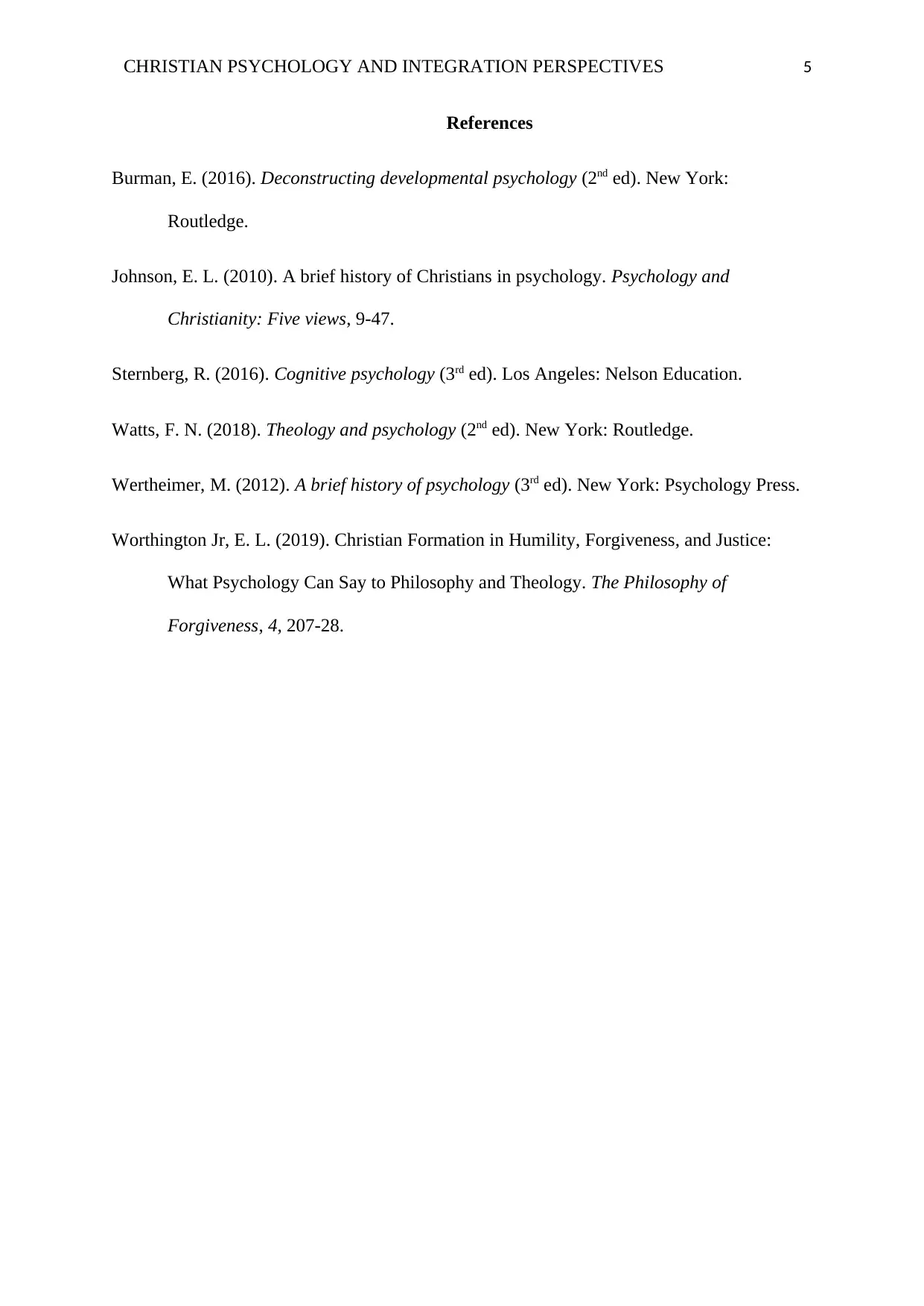
CHRISTIAN PSYCHOLOGY AND INTEGRATION PERSPECTIVES 5
References
Burman, E. (2016). Deconstructing developmental psychology (2nd ed). New York:
Routledge.
Johnson, E. L. (2010). A brief history of Christians in psychology. Psychology and
Christianity: Five views, 9-47.
Sternberg, R. (2016). Cognitive psychology (3rd ed). Los Angeles: Nelson Education.
Watts, F. N. (2018). Theology and psychology (2nd ed). New York: Routledge.
Wertheimer, M. (2012). A brief history of psychology (3rd ed). New York: Psychology Press.
Worthington Jr, E. L. (2019). Christian Formation in Humility, Forgiveness, and Justice:
What Psychology Can Say to Philosophy and Theology. The Philosophy of
Forgiveness, 4, 207-28.
References
Burman, E. (2016). Deconstructing developmental psychology (2nd ed). New York:
Routledge.
Johnson, E. L. (2010). A brief history of Christians in psychology. Psychology and
Christianity: Five views, 9-47.
Sternberg, R. (2016). Cognitive psychology (3rd ed). Los Angeles: Nelson Education.
Watts, F. N. (2018). Theology and psychology (2nd ed). New York: Routledge.
Wertheimer, M. (2012). A brief history of psychology (3rd ed). New York: Psychology Press.
Worthington Jr, E. L. (2019). Christian Formation in Humility, Forgiveness, and Justice:
What Psychology Can Say to Philosophy and Theology. The Philosophy of
Forgiveness, 4, 207-28.
1 out of 5
Related Documents
Your All-in-One AI-Powered Toolkit for Academic Success.
+13062052269
info@desklib.com
Available 24*7 on WhatsApp / Email
![[object Object]](/_next/static/media/star-bottom.7253800d.svg)
Unlock your academic potential
Copyright © 2020–2025 A2Z Services. All Rights Reserved. Developed and managed by ZUCOL.





